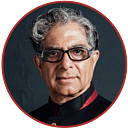The Matrix: How did we get here? How can we escape?
By Deepak Chopra, MD, FACP, FRCP
Sometimes a movie is more than a movie. The Matrix, which came out in 1999, was a science-fiction hit, but it also contained a disturbing image of reality. People went through their everyday lives not knowing they were trapped in an all-embracing AI creation: The Matrix. Nothing they saw around them was anything but a kind of virtual reality created by this monstrous machine. As the plot unfolded, a messiah emerged known as “the One,” who penetrated the veil of illusion to unplug humanity from the Matrix once and for all.
Everyone has moments when life feels unreal. We respond by saying things like “This can’t be happening” or “I feel like I’m in a dream.” Such moments can be good or bad — unlike the movie, we aren’t trapped in a menacing dystopia controlled by hidden overlords. But just as in the movie, a glimpse of the “real reality” is the key to escaping the Matrix.
The Matrix gave a technological update to the ancient concept of Maya, the illusion of everyday life that lies at the heart of Indian spirituality going back thousands of years. It also provided motivation to escape the illusion. Accepting it passively embroiled human beings in a mechanism that drained, quite literally, the life force inside us.
That is also the motivation needed right now. Ever since the pandemic, troubled times have kept us poised on the edge of anxiety. We find ourselves enmeshed in threats and insecurity, but unlike the movie, there is no messianic hero to bring delivery. Whether you call it the Matrix or Maya, escape is a personal project.
Social forces can drive you to participate in the matrix of fear, but society cannot get you out of it. Escape is something each person must confront on their own. I believe that freeing yourself from anxiety, threats, and insecurity is possible. More than that, you can learn how to be free of fear despite the presence of the crisis mentality that seems ever-present.
The key is to cultivate emotional intelligence because fear and insecurity are experienced as emotions. The value of emotional intelligence never changes, and when you focus on it, you will achieve something worthwhile. Here are six principles to guide you through the process.
· Commit to never complaining, criticizing, or playing the victim.
· Imagine a creative, positive future for yourself.
· Don’t regret the past. It no longer exists.
· Be present in every situation as it occurs.
· Be independent of other people’s criticism or approval.
· Be responsive to feedback.
It is fair to say that hardly anyone hits upon these principles by trial and error or through simply experiencing life. A person can live a long time without paying attention to emotional intelligence, and particularly for men, the word “emotion” too often connotes something undesirable, as if showing emotional sensitivity is a sign of weakness. (Such an attitude, like all beliefs driven by social forces, tells you how much we are influenced by the Matrix.)
But emotional intelligence is gender neutral. The fact that humans can observe their emotions is a remarkable trait, and once you begin to observe your own emotions, you can counter the power of unwanted emotions like fear and anxiety. Whether we admit it or not, emotions fascinate us, as Hollywood well knows. Empathizing with emotions onscreen is easy and pleasurable, but we are too attached to our own emotions, and it takes very little experience of anxiety, humiliation, rejection, and failure to train us to avoid the minefield of emotions in general.
It is worth saying that developing emotional intelligence isn’t scary or difficult. All you need to do is notice and pay attention. By pausing and standing back a little, you can observe how you are reacting at any given moment. You can even turn the six principles into questions posed to yourself.
Am I complaining, criticizing, or playing the victim?
Do I see my future in a creative, positive way?
Am I pointlessly reliving the past?
Do I see what’s going on right now?
Am I afraid of someone else’s criticism or craving their approval?
Am I listening to what other people are trying to tell me?
These are not mysterious or metaphysical questions. We can pause to ask them any time we want, and we should. But we are blocked by old conditioning and the habit of feeling uneasy about our emotions. There is a great deal of social pressure to behave with very low emotional intelligence, a kind of dumbing down on the feeling level. As a result, we act in self-defeating ways. To give a few examples,
We repeat the same reactions in most situations.
We imitate how others behave, starting with our family.
We act on impulse without a second thought.
We don’t see how others react to us.
We let negative emotions like fear, anger, envy, and resentment have their way.
We easily go into denial and seek outside distractions.
A whole way of life is implied in these examples, and when collective fear mounts, as it does right now, people often have little or no idea how to escape. Denial and distraction simply become more intensified, and playing the victim is more tempting than usual. Alternatively, we tell ourselves that we need to stay in control more than ever. But what is needed isn’t emotional self-control but emotional resilience.
Resilience is the most important single aspect of emotional intelligence. You allow your emotions to rise and fall naturally, without trying to stop or control them. Once an emotion has passed, you feel better, and you are able to return to a state of peace and calm. The opposite of emotional resilience is seen when people are stiff, reserved, bottled up inside, censorious, aloof, proud, or remote. In all of these cases past experience has made certain emotions unacceptable. The only way to deal with them is through avoidance. One is reminded of the adage that trees can be blown over by a storm while grasses bend without breaking.
Because the mind by nature is restful, alert, quiet, and at peace, that state of balance is the basis for developing emotional intelligence. You need the experience of balance in order to return to it at will. The experience comes naturally to everyone unless it is thrown off by stress and crisis. Then it takes a bit of intervention on our part, through meditation preferably. Meditation not only returns the mind to its balanced state, but it also allows you to observe what is happening, to experience it directly, and to identify with the quiet state of mind.
Ultimately, this is how fear can be escaped permanently. Meanwhile, everyone can benefit from lessening the anxiety being experienced all around us. Emotional intelligence goes a very long way to expanding your awareness and making you free of stress and anxiety right now.
For more on emotional intelligence, please see my book, Living in the Light, which goes into much more detail.
DEEPAK CHOPRA MD, FACP, FRCP, founder of The Chopra Foundation, a non-profit entity for research on well-being and humanitarianism, and Chopra Global, a whole health company at the intersection of science and spirituality, is a world-renowned pioneer in integrative medicine and personal transformation. Chopra is a Clinical Professor of Family Medicine and Public Health at the University of California, San Diego, and serves as a senior scientist with Gallup Organization. He is the author of over 90 books translated into over forty-three languages, including numerous New York Times bestsellers. Chopra has been at the forefront of the meditation revolution for the last thirty years. He is the author of the forthcoming book, Digital Dharma: How to Use AI to Raise Your Spiritual Intelligence and Personal Well-Being. TIME magazine has described Dr. Chopra as “one of the top 100 heroes and icons of the century.” www.deepakchopra.com





